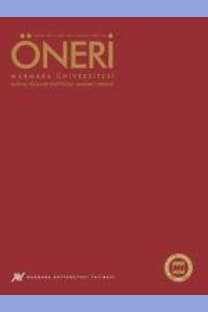İŞGÜCÜ TALEBİ ULUSLARARASI TİCARETE TEPKİ VERİYOR MU? TÜRK İMALAT SEKTÖRÜNDEN KANITLAR
Bu çalışmanın amacı, Türkiye’de uluslararası ticaretin imalat sanayi istihdamı üzerindeki etkisini 2003-2017 dönemi için incelemektir. Bu çalışma özellikle Türkiye’nin başlıca ticaret ortakları olan Avrupa Birliği Ülkeleri, Rusya, Amerika Birleşik Devletleri, Irak ve Çin ile ticaretinin istihdam üzerindeki etkilerini analiz etmektedir. Çalışmada elde edilen bulgular, seçilmiş ülkelere yapılan ihracattaki artışların Türkiye imalat sanayinde istihdam artışlarına yol açtığını göstermektedir. Bulgulara göre hem Avrupa Birliği ülkelerine yapılan ihracatın hem de bu ülkelerden yapılan ithalatın olumlu istihdam etkileri bulunmaktadır. Sadece dönem içinde en yüksek istihdam artışı olan sektörler ele alındığında ise, Amerika Birleşik Devletleri, Avrupa Birliği ve Irak’tan yapılan ithalatın istihdamı azaltırken, Çin ve Rusya’dan yapılan ithalatın imalat sanayinde istihdam artışına yol açtığı sonucuna ulaşılmıştır.
Anahtar Kelimeler:
Ticarete açıklık, İmalat Sanayileri, İstihdam, Panel veri tahmini
DOES LABOR DEMAND RESPOND TO INTERNATIONAL TRADE? EVIDENCE FROM THE TURKISH MANUFACTURING INDUSTRY
The aim of this study is to analyze the impact of international trade on employment in the Turkish manufacturing industry over the 2003-2017 period. Specifically, this study analyzes the employment effects of Turkey’s trade with its major trading partners, namely, European Union countries, Russia, the United States, Iraq, and China. The findings of the study reveal that increased exports to the selected countries lead to employment generation in Turkish manufacturing. Both exports to and imports from the European Union countries have positive employment effects. Considering only the sectors with the highest employment growth during the period we can conclude that imports from the United States, European Union, and Iraq have led to decline in employment however imports from China and Russia increased employment in the manufacturing industry.
___
- Acemoğlu, D., D. Dorn, G.H. Hanson & B. Price (2016), Import Competition and the Great US Employment Sag of the 2000s, Journal of Labor Economics, 34 (1), 141-198.
- Akkuş, G.E. (2014), The Effects of Trade and Productivity on Employment in The Manufacturing Industry of Turkey, İktisat Fakültesi Mecmuası, 64 (2), 1-44.
- Autor, D.H., D. Dorn & G.H. Hanson (2013), The China Syndrome: Local Labor Market Effects of Import Competition in the United States, American Economic Review, 103 (6), 2121-2168.
- Aydıner-Avşar, N. & Ö. Onaran (2010), The Determinants of Employment: A Sectoral Analysis for Turkey, The Developing Economies, 48 (2), 203-231.
- Balsvik R., S. Jensen & K.G. Salvanes (2015), Made in China, Sold in Norway: Local Labor Market Effects of an Import Shock, Journal of Public Economics, 127, 137-144.
- Erduman, Y., O. Eren & S. Gül (2020), Import Content of Turkish Production and Exports: A Sectoral Analysis, Central Bank Review, 20 (4), 155-168.
- Goldar, B. (2009), Impact of Trade on Employment Generation in Manufacturing in India, Institute of Economic Growth University of Delhi Enclave, Working Paper Series No. E/297/2009.
- Gozgor, G. (2016), International Trade and Manufacturing Employment in Developed Economies: An Empirical Study, Regional and Sectoral Economic Studies, 16 (1), 5-16.
- Greenaway, D., R.C. Hine & P. Wright (1999), An Empirical Assessment of the Impact of Trade on Employment in the United Kingdom, European Journal of Political Economy, 15 (3), 485-500.
- Grossman, G.M. (1987), The Employment and Wage Effects of Import Competition in the United States, Journal of International Economic Integration, 2 (1), 1-23.
- Hausman, J.A. & W.E. Taylor (1981), Panel Data and Unobservable Individual Effects, Econometrica, 49 (6), 1377-1398.
- Hayakawa, K., T. Ito & S. Urata (2019), Impacts of Increased Chinese Imports on Japan’s Labor Market, RIETI Discussion Paper Series 19-E-098.
- Herath, H.M.P.S. (2014), The Impact of International Trade on Employment Generation: A Sri Lankan Experience, International Journal of Economics, Commerce and Management, II (7), 1-8.
- Hiebert, P. & I. Vansteenkiste (2010), International Trade, Technological Shocks and Spillovers in the Labour Market: A GVAR Analysis of the US Manufacturing Sector, Applied Economics, 42 (24), 3045-3066.
- Jenkins, R. & K. Sen (2006), International Trade and Manufacturing Employment in the South: Four Country Case Studies, Oxford Development Studies, 34 (3), 299-322.
- Krishna, P., D. Mitra & S. Chinoy (2001), Trade Liberalization and Labor Demand Elasticities: Evidence from Turkey, Journal of International Economics, 55 (2), 391-409.
- Messerlin, P.A. (1995), The Impact of Trade and Foreign Direct Investment on Labour Markets: The French Case, OECD Jobs Study Working Papers No. 9.
- Onaran, Ö. (2011), The Effect of Import Penetration on Labor Market Outcomes: The Case of Austrian Manufacturing Industry, The International Trade Journal, 25 (2), 163-204.
- Raju, S., B.R. Chaudhuri & M.S. Mishra (2016), Trade Liberalization and Employment Effects in Indian Manufacturing: An Empirical Assessment, Working Papers MPIA 2016-19, PEP-MPIA.
- Tuhin, R. (2015), Impact of International Trade on Employment: Evidence from Australian Manufacturing Industries. Australian Government, Department of Industry and Science Research Paper: 2/2015.
- Yanıkkaya, H., A. Altun & P. Tat (2019), Openness and Deindustrialization: A Turkish Case, Boğaziçi Journal, Review of Social, Economic and Administrative Studies, 33 (2), 1-25.
- ISSN: 1300-0845
- Yayın Aralığı: Yılda 2 Sayı
- Başlangıç: 1994
- Yayıncı: Marmara Üniversitesi
Sayıdaki Diğer Makaleler
SÜRDÜRÜLEBİLİRLİK RAPORLAMASI VE BIST SÜRDÜRÜLEBİLİRLİK ENDEKSİNE TABİ ŞİRKETLERDE BİR ARAŞTIRMA
İŞGÜCÜ TALEBİ ULUSLARARASI TİCARETE TEPKİ VERİYOR MU? TÜRK İMALAT SEKTÖRÜNDEN KANITLAR
Pınar NARİN EMİRHAN, Evrim TURGUTLU
İŞVERENLERİN GÖZÜNDEN ROMANLARIN İSTİHDAM EDİLMESİNDE KARŞILAŞILAN PROBLEMLER
Muhammet Ersegün ERCİŞ, Çiğdem KAYA
ALGILANAN KİŞİ-ÇEVRE UYUM ÖLÇEĞİ’NİN (PPEFS-TR) TÜRKÇEYE UYARLANMASI
Fatma ÇAM KAHRAMAN, Evrim Funda İNKAYA HOROZ, İlknur ÖZALP TÜRETGEN
FARKLI SEKTÖRLERDE ÇALIŞAN KİŞİLERİN SANAL KAYTARMA FARKLILIKLARININ İNCELENMESİ
Selçuk KIRAN, Tuğba Gülten USLU, İlkim Ecem EMRE
CDS VE TAHVİL MARJLARI İLİŞKİSİ: BİBLİYOMETRİK BİR BAKIŞ AÇISINDAN LİTERATÜR ARAŞTIRMASI
